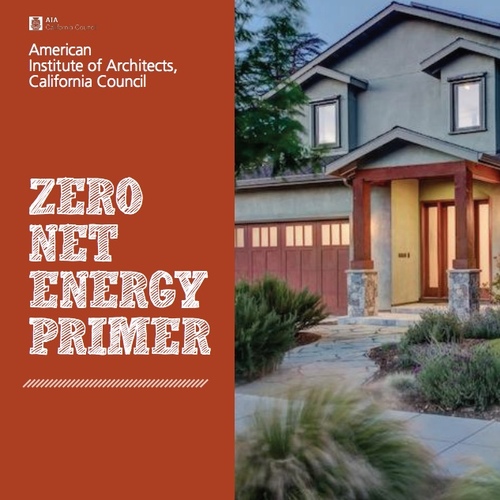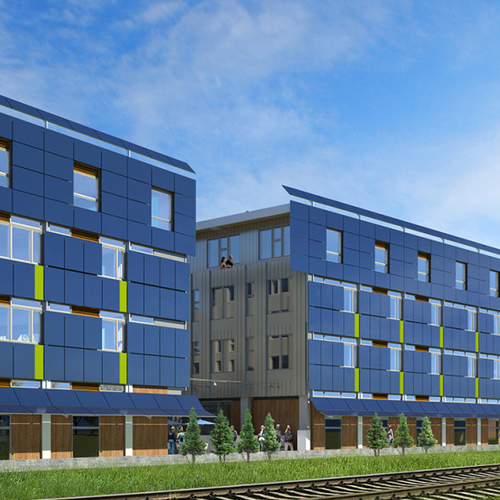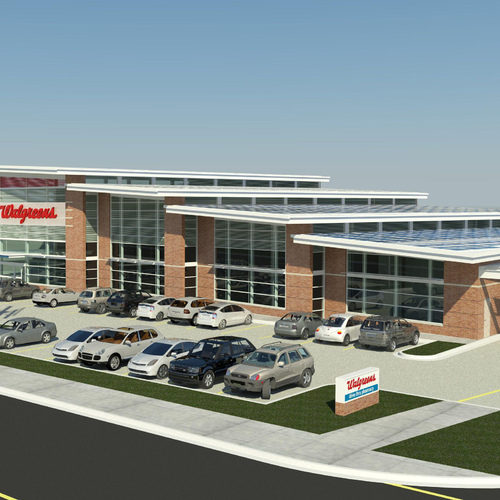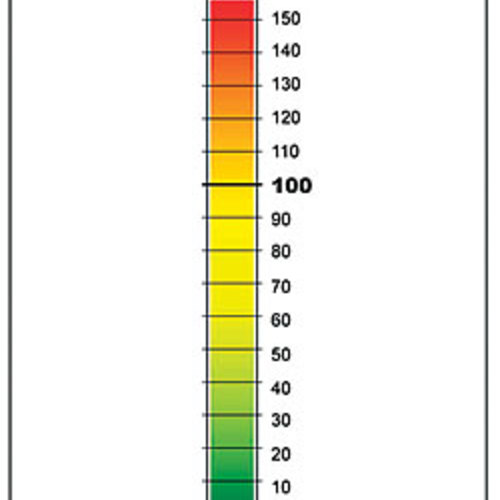
Lawmakers and climate activists in Massachusetts are urging state regulators to add a net-zero provision to statewide building codes.
The Massachusetts Climate Action Network, a nonprofit advocacy group, is circulating a letter asking the state’s Board of Building Regulation and Standards to add a net-zero clause to the state’s “stretch” code. Two legislators are pitching the same idea.
The stretch code is a second and more stringent tier of the state building code. While Massachusetts towns and cities aren’t required to adopt the stretch code, 262 of the state’s 351 towns and cities have opted to accept this tier of the code. It requires greater energy efficiency in new buildings than the Massachusetts base code.
The Climate Action Network organized the appearance of some 40 supporters before a May 7 meeting of the building standards board to speak in favor of a net-zero requirement, Energy News Network reported. At the same time, two state legislators have filed a bill that would require the board to adopt a net-zero stretch code. New buildings would have to meet their energy needs with renewable energy sources, both on and off site.
The Network’s letter doesn’t contain any details on the net-zero provision or how it would be phased in. It leaves those details for later, but the group argues that the change would clear the way for Massachusetts communities seeking more aggressive carbon reductions. Legally, communities can’t adopt energy provisions that are any more stringent than the current version of the stretch code. As a result, communities that want to require higher energy efficiency or carbon-natural buildings can’t really move ahead.
“We believe that this reform will help achieve the energy efficiency goals we have as a Commonwealth, and encourage Massachusetts communities to develop better, safer, and more climate-friendly buildings,” the letter reads.
Rebecca Winterich-Knox, an organizer for the Climate Action Network, said in an email that details of the net-zero requirement would be worked out during the regulatory process in conjunction with the state’s Department of Energy Resources.
Not everyone thinks net-zero is a good idea
Paul Eldrenkamp, whose firm Byggmeister specializes in high-performance remodels, told Energy News Network that a net-zero requirement doesn’t necessarily mean buildings will use less energy.
With enough room on the roof or in the back yard, homeowners with big, inefficient houses could meet a net-zero requirement simply by adding more solar panels.
“One of the unintended consequences of net-zero would be that you could build worse buildings and put more [solar] on them,” he said. “I am not a big fan of zero net energy as a building standard.”
Eldrenkamp said he would prefer a building code that requires lower energy consumption, such as the Passive House standard. He also said it’s important to chose building materials carefully to reduce the amount of carbon construction adds to the environment.
“If we’re investing a huge amount of carbon upfront in buildings that are going to have low operating carbon, we’re better off not building at all,” Eldrenkamp said.
In a telephone call, Eldrenkamp said that over time there’s been a convergence of the base and stretch codes in Massachusetts. The International Residential Code and the International Energy Conservation Code are updated every three years, and Massachusetts has followed suit. As a result, the base code has gradually evolved while the stretch code has not been rewritten since it was first enacted as part of the Green Communities Act of 2008.
The question now is what a new stretch code should look like, and a net-zero requirement as emerged as one possibility. But, Eldrenkamp said, the proposal has the effect of lumping renewable energy and building performance standards together when they should be addressed separately.
“I don’t agree with that,” he said. “Intuitively it doesn’t make a lot of sense to me. I want consistently good buildings, and I want the whole region working on decarbonizing the grid. I think those two efforts can best be achieved if we’re not trying to conflate or combine the two.”
Winterich-Knox said the proposed legislation includes a three- to five-year phase in period for the net-zero requirement for communities that have adopted the stretch code. “But to retain Green Community status,” she said, “all municipalities would have to adopt updated versions of the stretch code.” The net-zero provision would apply to all buildings, residential and commercial.
“We believe Passive House standard buildings are the easiest way to get to Net Zero and are proponents for Passive House,” she said. “However, we are focused more [on] making the overall building stock more efficient than on single-family homes.”
Stretch code update is possible this year
Despite the public push by the Climate Action Network, the building regulations board doesn’t actually have a formal proposal to consider, its vice chairman says.
“Nobody as yet has put forward a proposal for discussion about the stretch energy code,” Kerry Dietz, an architect, said in a phone call. “Discussions that have been happening are — basically, at a public hearing, a whole bunch of people were saying to the board that we want a stretch energy code, not what’s in it. There’s no language in front of the board right now.”
The board has an energy advisory committee, with representatives from across the industry, that has just completed writing state amendments to the 2018 IECC. Dietz said that group should be authoring a new stretch code for the state, but so far that’s not happening.
As to the gradual convergence of the stretch and base building codes, Dietz said that as the family of ICC codes have changed on a three-year cycle, so has the stretch code. “The stretch code has always said, ‘Do better than the base code,’ so the benchmark has been moving,” she said. “What many builders are saying is, ‘Well, we can’t go any further.’ That’s the argument from the industry. We can’t get any better than what the 2018 IECC already says to do … It requires us to do so much.”
When is the state likely to revise the stretch code? With any luck, by the end of the year, Dietz said. But for now, she added, “there is nothing in front of the board.”
Weekly Newsletter
Get building science and energy efficiency advice, plus special offers, in your inbox.















5 Comments
Add more and more taxes on new construction/upgrades and more and more people will remain in their old energy inefficient houses. Lots of market distortion because politicians don't want to properly regulate the utilities (or implement carbon taxes).
Forget net-zero (energy). The macro goal should be cost-effective net-zero environmental damage.
In an unregulated market you'd see changes relatively quickly.
A building code performance requirement isn't a tax.
But it can increase the cost of new construction. That in and of itself isn't necessarily a bad thing.
The case for "...in their old energy inefficient houses..." isn't much affected by the new construction market in MA (especially eastern MA where residential real estate is already pretty expensive.) Knocking down an old house to build a new IRC 2018 code minimum house (let alone a Net Zero house) isn't necessarily the least environmental damage, or even a prescription for lowering energy use. Knocking down 1500' Capes to build 4000' IRC code min McMansions seems to be a trend in suburban Boston, and the "after" picture often uses more energy than the "before". The cost adder of requiring it to be Net Zero is somewhat in the noise, yet cheaper & easier than requiring it to hit PassiveHouse.
Instead of new construction, retrofitting the older stock to some reasonable thermal performance level and spending the new construction cost on greener energy can be more beneficial. In my direct experience the thermal performance of most existing housing in MA is pretty low, but easily improved. Making the cost of a knock-down more expensive by requiring it to be Net Zero isn't necessarily a bad thing, but there are no simple models or simple solutions.
Eldrenkamp & Winterich-Knox's notion of PassiveHouse as an alternative to Net Zero isn't a particularly better. But Eldrenkamp is right that "...lumping renewable energy and building performance standards together..." is a mistake- it muddies the waters. Net Zero is more than just "...renewable energy..."- it's also about distributed generation and grid resilience. MA is one of the states moving forward on storage regulations. Distributed PV plus distributed storage can do a lot for greening/cleaning up the overall energy picture in the state & region while making grid power cheaper and more reliable.
It definitely doesn't bode well for the PH builders because adds additional competitive pressure.
Sure rooftop PV requires some modifications to the design of the house but IMO the homes still retain those design features which are familiar to buyers whereas PH design entails a lot of compromises.
Given that there are still fewer than ten certified PHIUS houses in Massachusetts it's not as if PH builders had much traction there in the first place.
https://www.phius.org/phius-certification-for-buildings-products/certified-projects-map
Nine down, 2,894,475 homes to go... The math isn't looking too good for PH so far.
https://www.census.gov/quickfacts/fact/table/ma/HSG010217#HSG010217
The first of those nine PH certified houses in MA was built by former Massachusetts Energy & Environmental Affairs Secretary, Matt Beaton (prior to assuming that position, which he left just a few weeks ago.)
https://www.greenbuildingadvisor.com/article/matt-beatons-full-court-passivhaus-press
https://www.greenbuildingadvisor.com/article/a-conservative-legislator-with-a-passivhaus-mindset
https://www.mass.gov/news/governor-baker-announces-new-secretary-of-the-executive-office-of-energy-and-environmental
I'll be surprised if Net Zero gets enshrined in MA building codes any time soon, but some variation of an Energy Scorecard requirement when homes are sold seems possible, maybe even likely within the next few years. Upgrading just one of those existing homes with obvious and correctable energy inefficiency defects has to be equivalent to the energy use difference of several PH vs IRC 2018 code minimum new houses.
https://energynews.us/2019/04/02/northeast/massachusetts-bill-would-require-home-energy-efficiency-scorecard-before-sales/
https://www.greenbuildingadvisor.com/article/massachusetts-bill-require-home-energy-assessments-prior-sale
(OOPS! Make that 12 PHIUS houses in MA, not 9. I missed the two on MV and the one i Falmouth. That makes it "only" 2,894,472 homes to go, not 2,894,475.)
Log in or create an account to post a comment.
Sign up Log in